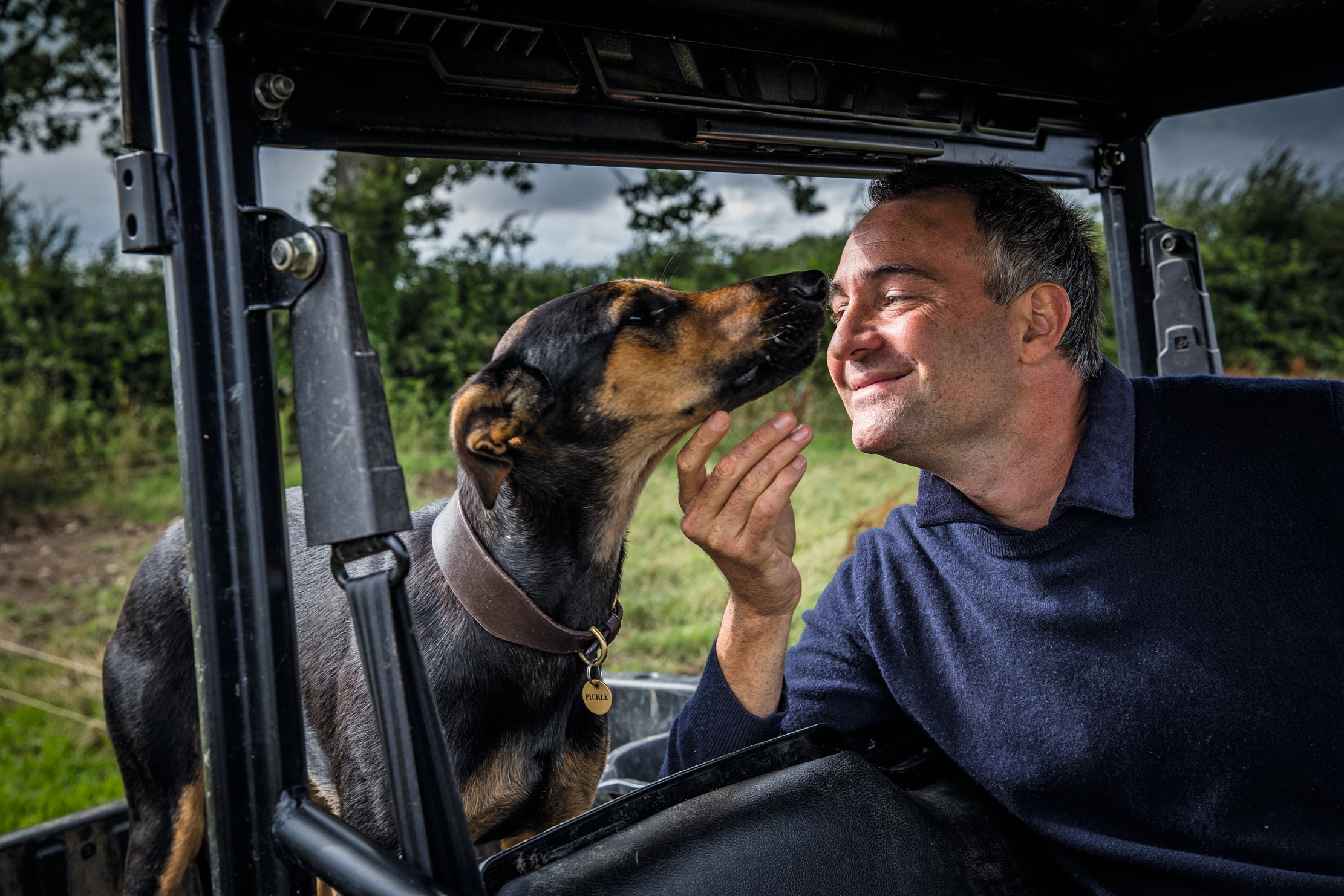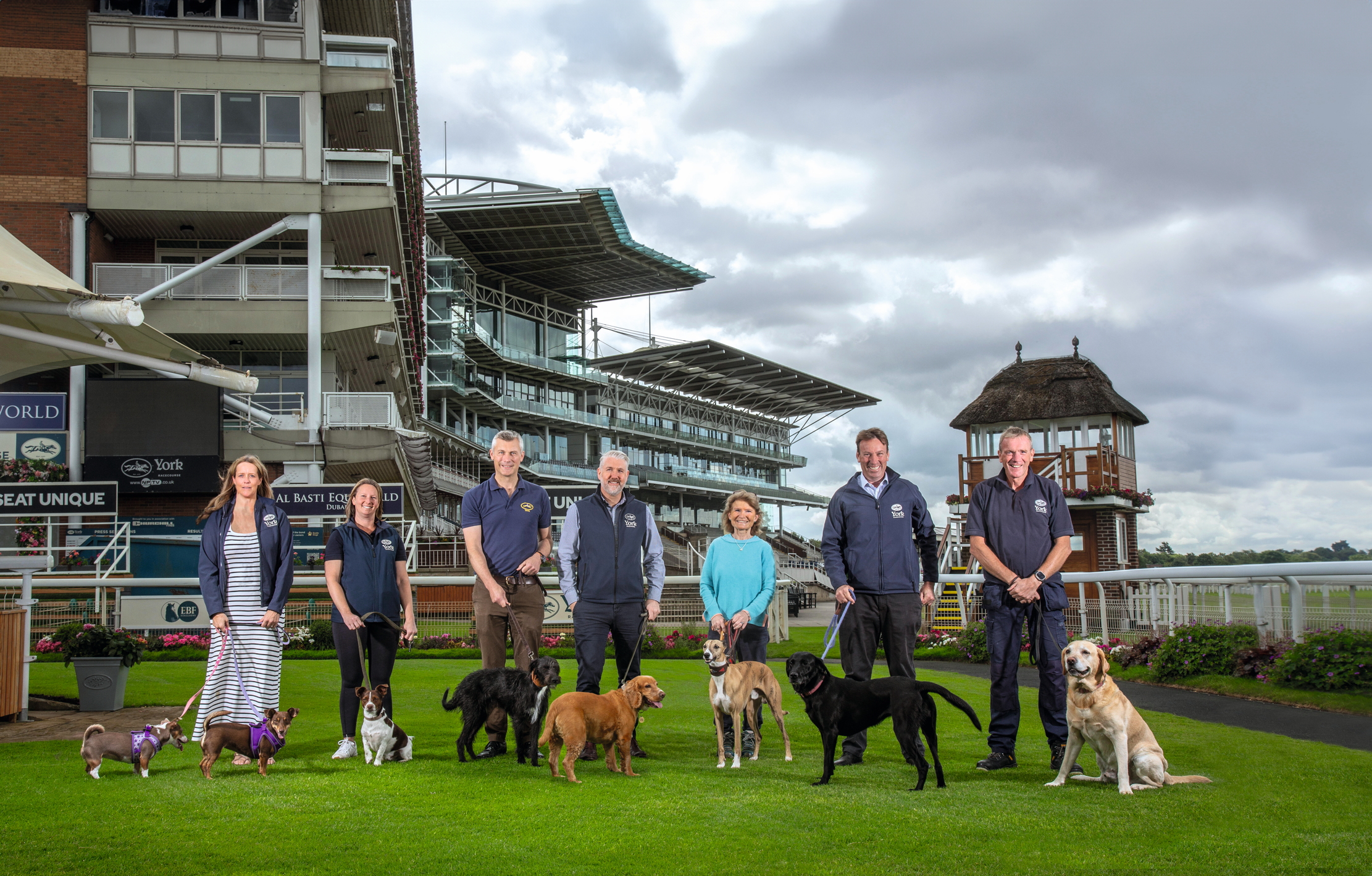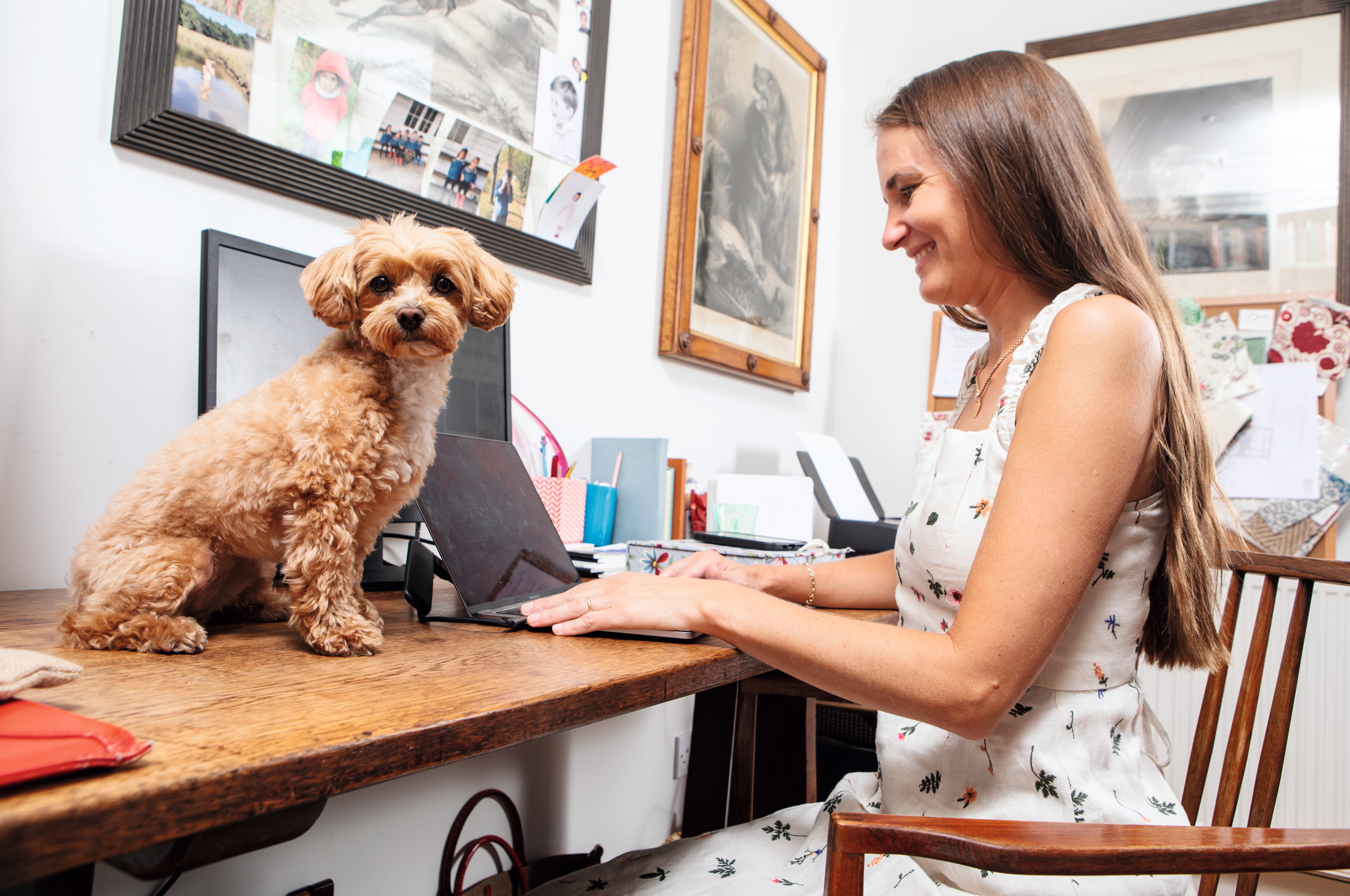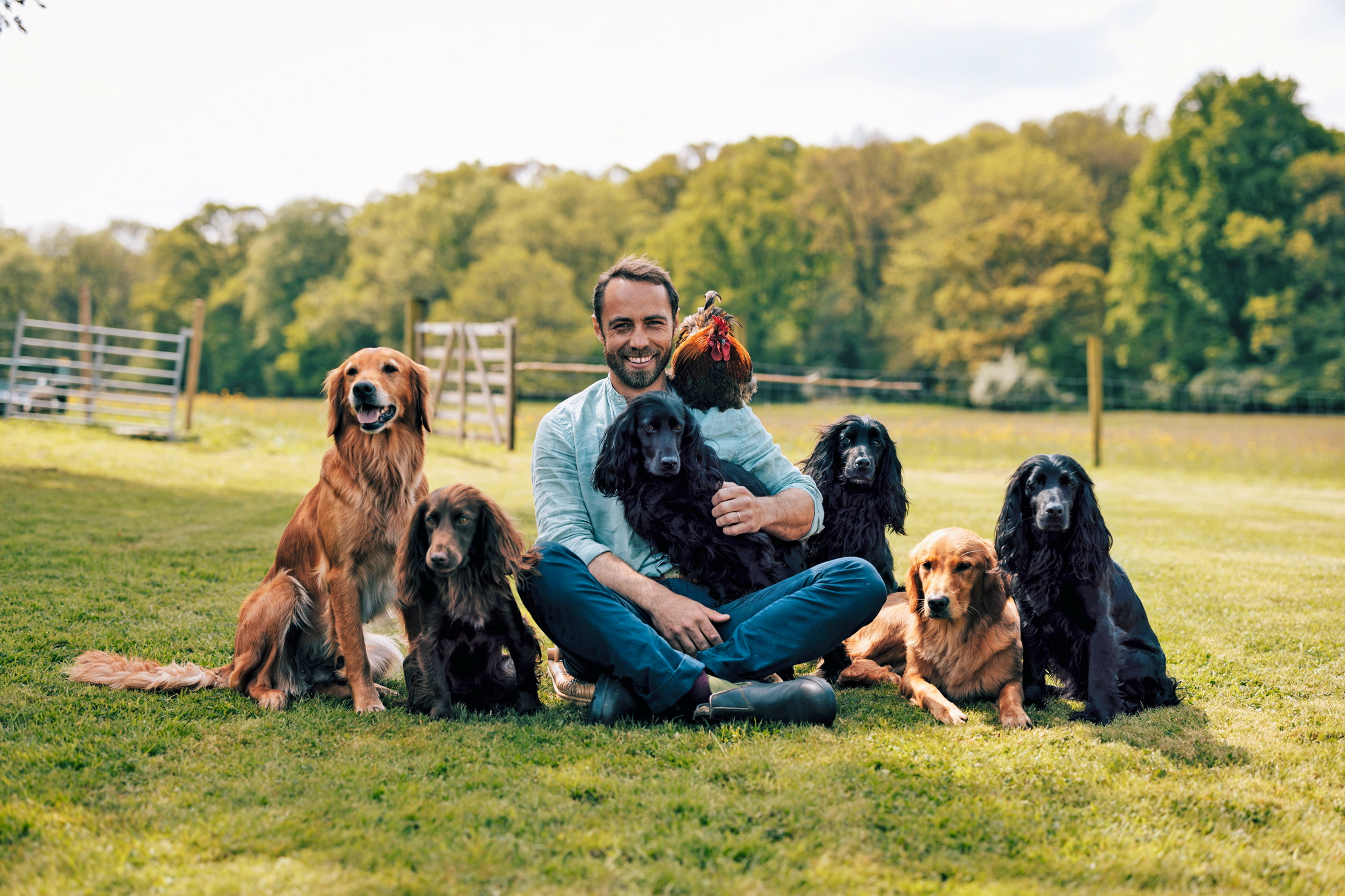'I really believe they increase productivity': If you want to get ahead, bring your dog to the office
Enhancing employee morale and increasing productivity is no longer reliant on outdated management techniques. The solution is simple, and on four legs.

Working like a dog used to refer to a life of toil, evoking images of collies crossing testing terrain from sunrise to sunset herding their ward. Now, there are probably more ‘working’ dogs than at any time in our history. However, instead of catching rats, wrangling livestock or proudly standing guard, they are ensconced in offices the length and breadth of the country.
Undoubtedly a legacy of covid, the RSPCA reported that more than three million so-called ‘pandemic puppies’ were acquired in the UK during those dark days of the modern plague and, as shoulders returned to the wheel, many had to wave forlorn farewells to their canine companions.
Meanwhile, in the US, once lockdown was lifted, employers didn’t pussyfoot about and, now, one in five American companies allow employees to bring dogs into the workplace. These aren’t quirky little startups, either, but big hitters such as Google, Uber and Airbnb. Amazon’s main campus in Seattle, for example, has a park for its 8,000 registered dogs. This transatlantic trend made its way across the pond and allowing employees to bring a dog to work is now considered (forget company cars) a perk of the highest order.
A Society for Human Resource Management (SHRM) survey in the US revealed that 24% of people would consider quitting their job to move to a pet-friendly workplace. Back in the UK, Kennel Club (KC) research shows 70% of people believe dogs alleviate stress in the workplace, with 67% saying they believe canine company makes the atmosphere more friendly.
Earlier this month, new KC research crowned Greater London as the region with the most dog-friendly offices, with two-fifths (40%) of dog owners confirming their workplace is open to dogs and almost a quarter (22%) having specific dog-friendly policies in place.
Of course, not everyone is a pet person and a clear canine policy may mitigate against the proverbial dog’s dinner. Make-up-artist-cum-entrepreneur Charlotte Tilbury unleashed an extremely popular hybrid system to combat any confusion — her London headquarters permits dogs three days a week, allowing those who are less inclined towards furry distractions a break on Tuesdays and Thursdays. At the other end of the spectrum is craft brewery BrewDog, which offers a week’s paid ‘pawternity’ leave for staff to bond with a new puppy or rescue.
There will always be those who say the world’s gone barking mad, but perhaps city dwellers are simply catching up with what the rural population has always known. After all, how many country-estate offices have been made happier (if not more fragrant) places to work by waggy-tails over the past century or so?
Exquisite houses, the beauty of Nature, and how to get the most from your life, straight to your inbox.
As Irish comic dramatist George Bernard Shaw observed: ‘If you eliminate smoking and gambling, you will be amazed to find that almost all an Englishman’s pleasures can be, and mostly are, shared by his dog.’
‘It’s a right of passage for each dog to come to London’
Every four years, Ben Goldsmith has a litter of puppies and always keeps one. ‘I’m hoping this feature in Country Life might find a female mate, a wife, for Pickle,’ confides the financier and environmentalist. Pickle is five and further vital statistics can be provided on request. His master has kept lurchers throughout his adult life and all are descendants of that very first pup, Olive, which had been bred by the late then Lucy Ferry (her second marriage was to Ben’s brother, Robin Birley).
Although Elvis, 14, and 10-year-old Tarka remain at Mr Goldsmith’s Somerset farm, Pickle is taking his turn, as the youngest of the pack always does, to spend the working week in London. He sits impeccably under the train seat, so quietly in fact that his owner confesses once forgetting him, resulting in a shame-faced dash back to the station. ‘I like the way lurchers have confidence and are lively on a walk, but are discreet in the house,’ he explains, adding he has an aversion to spoiled dogs, ranking them below indulged children.
Although sitting on the furniture is strictly off limits for dogs in the country home Ben shares with his wife, Jemima Jones, and their children, the chosen London dog is allowed to sit in a chair next to his desk when he visits the capital. ‘They are so clever, taking the armchair next to me when I’m working, but never going on any other furniture,’ he reflects. ‘It’s a kind of rite of passage for each dog to come to London and it would feel very odd not to have one with me.’
This appreciation of canine companionship comes as no surprise as his mother, Lady Annabel Goldsmith, has always kept dogs and even wrote a book about one, a rescue mongrel called Copper. His sister, Jemima Khan Goldsmith, has the most striking white Alsatian, whereas his brother Robin is always accompanied by English bull terrier, Peg, and welcomes dogs into his London clubs.

The York Racecourse team with their dogs.
‘It makes me smile when I see staff mixing because of the dogs’
William Derby is one of the most successful racecourse CEOs in the world. His unassuming manner belies the fact that the flagship race at his beloved York Racecourse, the Group 1 Juddmonte International, was last year rated the best in the world. In fact, it’s the second time in five years that the city’s historic Knavesmire course — of which The Queen is patron — has taken the Longines World’s Best Horserace accolade.
With his black labrador Bella by his side, it’s easy to see why he has never switched stables. That and, of course, the way he — together with his wife, Polly — have been able to give their daughters an idyllic upbringing in the North Yorkshire countryside. ‘We’ve had black labradors all my life, my mother remembers me sleeping with them in the dog bed,’ he reminisces.
Visitors to the racecourse office are greeted by Jack Russell Roni. Head of security (barring entry to anybody wearing hi-vis and policing parcels), Roni’s favourite hobby outside of work is chasing things, mostly squirrels and joggers. Legend has it he once set off after a fox all the way down the home straight.
Roni is one of about 10 dogs to ‘work’ at the racecourse and William has been a forerunner, dedicating a staff handbook section to it. As well as chief executive, he is the clerk of the course and taking Bella out around the two-mile track is invaluable in assessing the going. The only misdemeanour he ignores is if she scatters any pigeons pecking newly-sown grass seed from the hallowed turf.
Revealing a sliver of the progressive management skills that have made him a winner in his chosen field, William shares that there is no finer personnel strategy for ‘cross departmental relations, ideas and team spirit’ than office dogs, with non-owners often walking them. ‘It never fails to make me smile when I see staff mixing with each other because of the dogs,’ he concludes.

Victoria von Westenholz with Delphi the Maltipoo.
‘She’s such super company — an unexpected joy’
Office faux paws
Dogs, like their owners, need to navigate the potentially stormy waters of office etiquette. The following are unacceptable:
• Sitting in another dog’s basket is as frowned upon as lifting a leg against the wastepaper basket
• Excessively shedding hairs
• Jumping up, especially on Hilary from human resources’s new cashmere cardigan
• Sitting on—or chewing—the office furniture
• Wolfing down somebody else’s lunch (canine colleague or human)
• Poor personal hygiene, including fleas, a pungent odour or an excess of slobber
• Barking, although it’s worth noting that yapping (often the language of terriers) is 10 times worse
• Mating or any inappropriate sexual overtures
• Fighting
• Begging for—or burying—food or other items (the stapler hasn’t been seen since 2023)
Society interior designer Victoria von Westenholz is rarely seen without her Maltipoo. ‘I grew up with spaniels and Delphi couldn’t be more different, like a rather silly little teddy bear,’ recalls Victoria of the petite poodle-cross-Maltese. ‘Living in London, a dog was not part of the plan, but our daughter was struggling with her spelling and I promised — thinking it wouldn’t happen — that we’d get one if she got them all correct. Low and behold, she got 15 out of 15.’
Resourceful when faced with a rather large price tag in relation to such a small dog, Victoria auctioned two signed, early-edition Harry Potter books, given when the author visited her alma mater North Foreland Lodge. ‘I’m sure J. K. Rowling wouldn’t mind if she met Delphi,’ she says with a smile. A natural flirt, Delphi has her mistress’s husband, Thomas McCall, wrapped around her tiny paw and when not ruling the roost in the kitchen of their Battersea cottage she’s sleeping on their son’s bed. Twice a week, she travels to the Hertfordshire office of Westenholz Antiques and Interior Decoration, which Victoria runs alongside her father, Piers.
‘She’s such super company — a totally unexpected joy,’ she declares, adding her handbag size means she can swiftly be secreted away from cream carpets.

James Middleton with his dogs (from left) Mabel, Nala, Inka, Zulu, Isla, Luna and Peter the chicken
‘I really believe they increase productivity’
If he’s not in the City for meetings, James Middleton can be found at his desk in the boot room of his Berkshire farmhouse surrounded by his half-dozen dogs: two golden retrievers and four cocker spaniels.
He prefers names of four letters and two syllables, so that, when he shouts, they all come running. All the spaniels — as well as Orla, the family pet of his sister The Princess of Wales — are related to his first dog Ella, about whom he wrote a book charting her constant companionship when he was battling depression. This founding member of his dog dynasty leaves another legacy, with a dog-food business bearing both their names.
‘I started the business during the pandemic and the whole team works remotely,’ says James. ‘When we all get together, there are dogs everywhere and I really believe they increase productivity. Ideas come from those 15-minute breaks taking them out to the garden. Dogs in the workplace should be a generic “yes” unless there is a very good reason to say no.’
James, whose top tip is an abundance of large dog beds, is a stickler for training, confessing it would be chaos keeping so many if they weren’t obedient. At home, he takes them along to both the pub and church. In London, they travel by Tube and pose no threat to the squirrels in Hyde Park (take note, Roni from York Racecourse). Together with his wife, Alizée Thevenet, and their young son, James is relishing country life, taking pleasure from simple things such as keeping Herdwick sheep and hens. Strictly no chasing allowed, of course.
Sarah Todd is an award-winning journalist with 30 years' experience. A former news reporter and magazine editor, she specialises in rural stories for the likes of Farmers Weekly, Farmers Guardian, The Daily Telegraph, Country Life and many more. She is a long-standing Guild of Agricultural Journalists member.